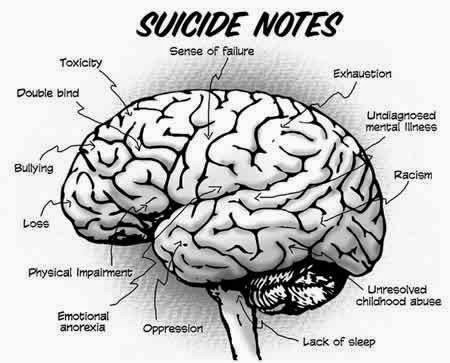Recognize Depression Symptoms and Get
Effective Help
The normal ups and downs of life mean that everyone
feels sad or has "the blues" from time to time. But if emptiness and
despair have taken hold of your life and won't go away, you may have
depression. Depression makes it tough to function and enjoy life like you once
did. Understanding the signs, symptoms, causes, and treatment of depression is
the first step to overcoming the problem.
Sadness or
downswings in mood are normal reactions to life’s struggles, setbacks, and
disappointments. Many people use the word “depression” to explain these kinds
of feelings, but depression is much more than just sadness. Some depressed
people don't feel sad at all – they may feel lifeless, empty, and apathetic, or
men in particular may even feel angry, aggressive, and restless. Whatever the
symptoms, depression is different from normal sadness in that it engulfs your
day-to-day life, interfering with your ability to work, study, eat, sleep, and
have fun.
Signs and
symptoms of depression
Depression varies from
person to person, but there are some common signs and symptoms. It’s important
to remember that these symptoms can be part of life’s normal lows. But the more
symptoms you have, the stronger they are, and the longer they’ve lasted—the
more likely it is that you’re dealing with depression. When these symptoms are
overwhelming and disabling, that's when it's time to seek help.
Signs and
symptoms of depression include:
- Feelings of helplessness and hopelessness
- Loss of interest in daily activities
- Appetite or weight changes
- Sleep changes
- Anger or irritability
- Loss of energy
- Self-loathing
- Reckless behavior
- Concentration problems
- Unexplained aches and pains
Causes and
risk factors for depression:
- Loneliness
- Lack of social support
- Recent stressful life experiences
- Family history of depression
- Marital or relationship problems
- Financial strain
- Early childhood trauma or abuse
- Alcohol or drug abuse
- Unemployment or underemployment
- Health problems or chronic pain
The cause
of your depression helps determine the treatment
Understanding the
underlying cause of your depression may help you overcome the problem. For
example, if you are depressed because of a dead end job, the best treatment
might be finding a more satisfying career, not taking an antidepressant. If you
are new to an area and feeling lonely and sad, finding new friends at work or
through a hobby will probably give you more of a mood boost than going to
therapy. In such cases, the depression is remedied by changing the situation.
The road
to depression recovery
Just as the symptoms
and causes of depression are different in different people, so are the ways to
feel better. What works for one person might not work for another, and no one
treatment is appropriate in all cases. If you recognize the signs of depression
in yourself or a loved one, take some time to explore the many treatment
options. In most cases, the best approach involves a combination of social
support, lifestyle changes, emotional skills building, and professional help.
Ask for
help and support
The key to depression
recovery is to start small and ask
for help. The simple act of talking to someone face to face about
how you feel can be an enormous help. Having a strong support system will speed
your recovery. Isolation fuels depression, so reach out to others, even if you
feel like being alone or don’t want to feel like a burden to others. So, let
your family and friends know what you’re going through and how they can support
you.
Make healthy
lifestyle changes
- Cultivating supportive relationships
- Getting regular exercise and sleep
- Eating healthfully to naturally boost mood
- Managing stress
- Practicing relaxation techniques
- Challenging negative thought patterns
Build emotional skills
Many people lack
the skills needed to manage stress and balance emotions. Building emotional
skills can give you the ability to cope and bounce back from adversity, trauma,
and loss. In other words, learning how to recognize and express your emotions
can make you more resilient.
Seek professional help
If support from
family and friends, positive lifestyle changes, and emotional skills building
aren’t enough, seek help from a mental health professional. There are many
effective treatments for depression, including therapy, medication, and
alternative treatments.
Antidepressants
Medication can
help relieve the symptoms of depression in some people, but they aren’t a cure
and they come with drawbacks of their own. Learning the facts about
antidepressants and weighing the benefits against the risks can help you make
an informed and personal decision about whether medication is right for you.
Therapy
Effective
treatment for depression often includes some form of therapy. Therapy gives you
tools to treat depression from a variety of angles. Also, what you learn in
therapy gives you skills and insight to prevent depression from coming back.
Some types of therapy teach you practical techniques on how to reframe negative
thinking and employ behavioral skills in combating depression. Therapy can also
help you work through the root of your depression, helping you understand why
you feel a certain way, what your triggers are for depression, and what you can
do to stay healthy.
"Don't let your struggle become your identity."




No comments:
Post a Comment